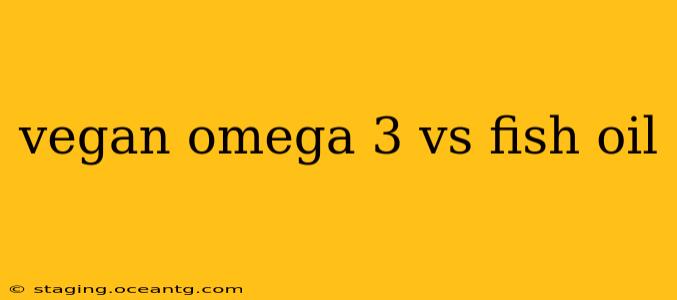The debate between vegan omega-3s and fish oil often arises for health-conscious individuals seeking to optimize their intake of these essential fatty acids. Both sources offer potential health benefits, but they differ significantly in their origins, compositions, and potential side effects. This comprehensive comparison will delve into the key distinctions, helping you make an informed choice for your dietary needs.
What are Omega-3 Fatty Acids?
Before diving into the specifics of vegan omega-3s versus fish oil, let's establish a fundamental understanding. Omega-3 fatty acids are polyunsaturated fats crucial for various bodily functions. They play a vital role in reducing inflammation, supporting brain health, promoting heart health, and contributing to overall well-being. The two most important omega-3s are EPA (eicosapentaenoic acid) and DHA (docosahexaenoic acid), predominantly found in fatty fish, and ALA (alpha-linolenic acid), found in plant-based sources.
Vegan Omega-3 Sources: ALA, DHA, and EPA from Plants
Unlike fish oil, which directly provides EPA and DHA, vegan omega-3 sources primarily contain ALA. Your body can convert ALA into EPA and DHA, but this conversion process is often inefficient. Therefore, supplementing with algae-based DHA and EPA is becoming increasingly popular to ensure adequate levels of these essential fatty acids.
Common Vegan Omega-3 Sources:
- Flaxseeds: Rich in ALA, easily incorporated into your diet through ground flaxseeds, flaxseed oil, or flaxseed meal.
- Chia Seeds: Another excellent source of ALA, offering a similar nutritional profile to flaxseeds.
- Walnuts: Contain a moderate amount of ALA, contributing to your overall omega-3 intake.
- Hemp Seeds: Provide both ALA and smaller amounts of other beneficial fatty acids.
- Algae-based supplements: These offer a direct source of EPA and DHA, bypassing the conversion limitations of ALA.
Fish Oil: A Direct Source of EPA and DHA
Fish oil is extracted from fatty fish like salmon, tuna, mackerel, and sardines. It's a readily available and well-researched source of EPA and DHA, the omega-3s directly utilized by the body. However, the sustainability and environmental impact of fish oil production are significant concerns.
Vegan Omega-3 vs. Fish Oil: Key Differences
| Feature | Vegan Omega-3 (ALA, Algae-based DHA/EPA) | Fish Oil (EPA and DHA) |
|---|---|---|
| Source | Plants, Algae | Fatty Fish |
| EPA/DHA Content | Lower (unless algae-based) | High |
| ALA Content | High | Low |
| Sustainability | Generally more sustainable | Potential environmental concerns |
| Purity | Less likely to be contaminated with heavy metals | Potential for heavy metal contamination |
| Cost | Can vary, algae-based supplements tend to be more expensive | Generally less expensive |
| Conversion Efficiency | Body's conversion of ALA to EPA/DHA is variable | Direct absorption of EPA/DHA |
Are Vegan Omega-3s as Effective as Fish Oil?
This is a complex question. While fish oil provides readily available EPA and DHA, algae-based vegan omega-3 supplements also offer these crucial fatty acids. The effectiveness of ALA conversion to EPA and DHA varies greatly between individuals. Therefore, for those seeking a direct and efficient source of EPA and DHA, algae-based supplements may be a more effective choice than relying solely on ALA-rich plant foods.
What are the potential side effects of Vegan Omega-3s?
Generally, vegan omega-3s, including algae-based supplements, are well-tolerated. However, some individuals might experience mild digestive upset like gas or diarrhea, especially when starting higher doses. Always follow the recommended dosage on the supplement label.
What are the potential side effects of Fish Oil?
Fish oil can cause digestive issues, such as fishy burps, nausea, and diarrhea. Additionally, there's a risk of heavy metal contamination in some fish oil products. Choosing high-quality, rigorously tested supplements is crucial to mitigate this risk.
Which is better for vegetarians/vegans?
For vegetarians and vegans, algae-based omega-3 supplements are the most appropriate option, offering a direct and ethical source of EPA and DHA. However, incorporating ALA-rich foods into the diet provides additional benefits and contributes to overall omega-3 intake.
Which is better for heart health?
Both fish oil and vegan omega-3s have been linked to various cardiovascular benefits. However, more research is still needed to completely compare their long-term effects on heart health.
Which is better for brain health?
Both DHA and EPA are crucial components of the brain, contributing to cognitive function and overall brain health. Algae-based supplements and fish oil can play beneficial roles in brain health, but further research is still ongoing.
This detailed comparison allows you to assess the pros and cons of vegan omega-3s and fish oil, ultimately empowering you to make the best choice for your individual health needs and lifestyle. Remember to consult with your doctor or a registered dietitian before making any significant changes to your diet or supplement regimen.
